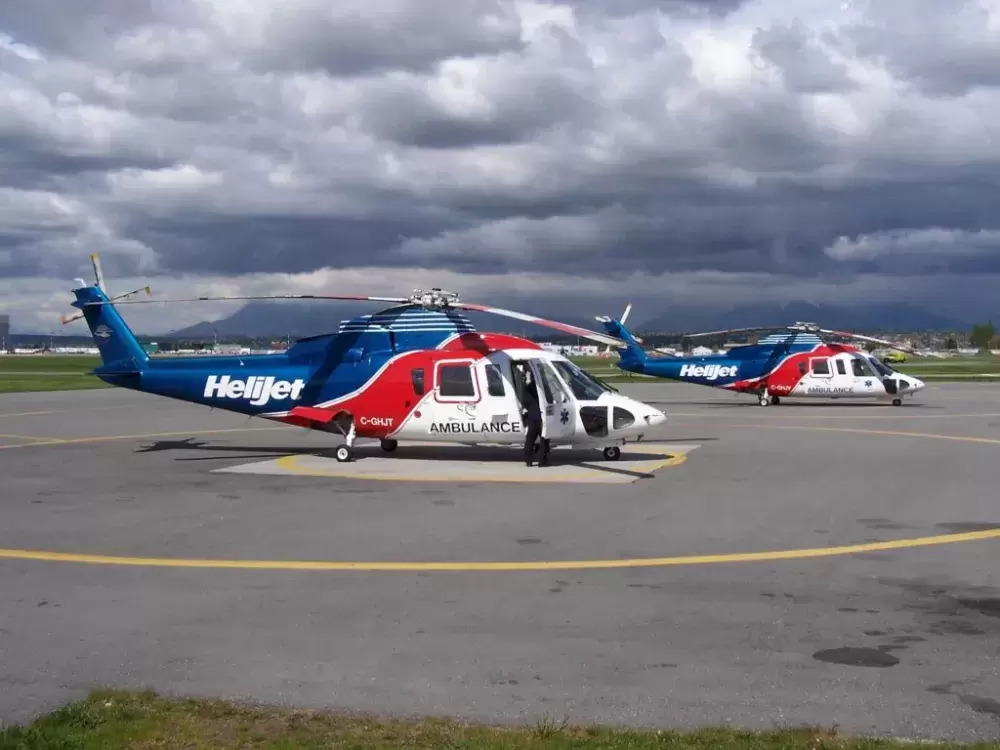The people of Kyuquot are asking why the BC Ambulance Service refused to perform an air evacuation on Sunday evening, after a young resident fell critically ill with appendicitis.
According to great-aunt Janice Smith, Desmond Bell, 13, had been sick and vomiting for two days, but his illness peaked on Sunday. That’s when his mom, Priscilla Jack, called the nurse.
“She came over and assessed him, and said she thought it was appendicitis,” Smith told Ha-Shilth-Sa. “She called to make arrangements for the air ambulance to come in with the chopper, and they said, ‘No. It’s too late. We can’t come in.’
“That was at about 7 o’clock. It was a clear blue sky.”
That came as a major surprise.
“They’ve been here before – late at night,” Smith said. “They usually land at the school, on the field. Our people bring trucks in for lights. They set up in each corner so it’s well lit up.”
On Thursday, Ha-Shilth-Sa spoke with BC Emergency Health Services communications officer Shannon Miller, who investigated the incident
"It was a case of the light conditions," Miller explained. "The call came in at 19:48 (7:48 pm). They do an assessment based on their routes, and what routes are approved under what light conditions. They didn't have a night route to go there... they determined there was not enough time to get in and out."
Miller explained that the province owns and operates 11 air ambulances, and contracts a further 45 aircraft (fixed-wing and helicopter) around B.C. The Sunday night call was received at the contracted air base in Port McNeill.
"It is about 45 minutes from Port McNeill to Kyuquot by air ambulance," she said. "For the Vancouver air ambulance, you're looking at an hour and 45 minutes to get there."
Miller said that, as a last resort in a life-or-death situation, BCEHS doctors have been able to call in a night-certified military helicopter from Canadian Forces Base Comox.
Apparently, that option was not followed.
According to a written statement from EHS: “In collaboration with the community nurse and paramedic, on scene with the patient, it was determined to evacuate through the quickest emergency response route via a water taxi to the closest road route and out of the area.”
With no air ambulance on the horizon, the nurse had to arrange a regular BC Ambulance to come in from Zeballos, to make the pickup in Fair Harbour. But first, Desmond had to be transported to the dock, so he could make the boat journey to Fair Harbour.
“They got him into the stretcher and down to the boat by about 9 or 9:30 [9:30 according to EHS]. It’s getting dark now. The boat took him to Fair Harbour, and they took him up to the ambulance,” said Smith. “They had to take a couple of extra guys to carry him and get him into the ambulance.”
Smith said Desmond and his mother departed at about 10 p.m., travelling by gravel road to Zeballos. According to EHS, the ambulance arrived in Zeballos at 11:10 pm, and Desmond was transferred to a second ambulance, for a Code 3, lights-and-siren run to Campbell River.
“A gravel road is horrible for anybody with appendicitis. For a sick person to go in an ambulance… he was in so much pain,” Smith said.
That is a point that BCEHS concedes, according to the release:
“We know it can be very stressful, and uncomfortable waiting for an ambulance, and travelling a long distance to the hospital.”
There is some disagreement on when the ambulance arrived in Campbell River. Smith was advised that Desmond and his mother did not arrive until 5 a.m., but according to EHS records, the ambulance arrived at 2:15 am.
But in any case, it was quite some time until Desmond was assessed and treated, Smith said. Eventually, the attending staff performed the appropriate tests for suspected appendicitis.
“They gave him medication, then they were waiting for the test results. They confirmed that it was appendicitis. He finally went into surgery after 1 (p.m.),” Smith said.
As of Thursday morning, Ha-Shilth-sa had not been apprised of Desmond’s condition, other than that he had successfully undergone surgery.
Miller said the timing of the incident was somewhat ironic, in that the BCEHS helicopter crews are just in the process of completing certification in the use of night vision. The province will make the formal announcement next week, she added.
"They are just now qualified. They have been working with the military to get the latest technology," said Miller.
As aviation contracts expire, operators will be required to obtain night-vision certification to work for the province.
Ha-Shilth-Sa made contact with the provincial health ministry through the office of Courtenay-Alberni MLA Scott Fraser, but had not received a statement.







